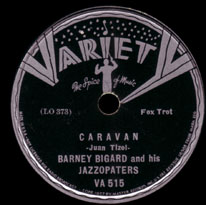Caravan (Juan Tizol and Duke Ellington song)
| "Caravan" | |
|---|---|
 "Caravan" on Variety | |
| Single by Barney Bigard and His Jazzopators | |
| Released | 1936 |
| Genre | Jazz |
| Composer(s) | Juan Tizol, Duke Ellington |
| Lyricist(s) | Irving Mills |
"Caravan" is an American jazz standard that was composed by Juan Tizol and Duke Ellington and first performed by Ellington in 1936. Irving Mills wrote lyrics, but they are rarely sung. The song has regained popularity since being featured prominently in the 2014 film Whiplash.
Original recording
[edit]The first version of the song was recorded in Hollywood in 1936 and performed as an instrumental by Barney Bigard and His Jazzopators.[1] Two takes were recorded, of which the first (Variety VA-515-1) was published. The band members were:
- Cootie Williams – trumpet
- Juan Tizol – trombone
- Barney Bigard – clarinet
- Harry Carney – baritone saxophone
- Duke Ellington – piano
- Billy Taylor – double bass
- Sonny Greer – drums
The musicians were members of the Duke Ellington Orchestra, which often split into smaller combinations to record songs under different band names. For this recording, which included Ellington and Tizol as performers, the session band leader was Bigard. As of 2024 this is the most covered song in history with over 500 versions published.[2]
Other versions
[edit]The sound of "Caravan" appealed to exotica musicians; Martin Denny, Arthur Lyman and Gordon Jenkins all covered it. The Mills Brothers recorded an a cappella version of the song. More than 350 versions have been recorded.[3]
- Duke Ellington – New York, May 14, 1937[1]
- Valaida Snow – Valaida Snow (vocal and trumpet) and her Orchestra, 1939, Sonora
- Art Tatum – Los Angeles, April–July 1940[1]
- Dizzy Gillespie – October 25, 1951[1]
- Chet Atkins - A Session with Chet Atkins, 1954
- Thelonious Monk – Thelonious Monk Plays Duke Ellington, Hackensack, New Jersey, July 27, 1955[1]
- Nat King Cole – After Midnight, Los Angeles, September 14, 1956[1]
- Santo & Johnny's – Santo & Johnny (1959), peaked at number 48 on the Billboard Hot 100 chart[4]
- Art Blakey and the Jazz Messengers – Caravan, New York, October 23, 1962[1]
- Wes Montgomery – Movin' Wes, New York, November 16, 1964[1]
- Dizzy Gillespie and Oscar Peterson – Oscar Peterson and Dizzy Gillespie, London, November 28–29, 1974[1]
- Les Paul & Chet Atkins – Chester and Lester, May 6–7, 1975
- Art Pepper – Friday Night at the Village Vanguard, New York, July 29, 1977[1]
- Little Steven and the Disciples of Soul, a live version (credited as "From the motion picture Men Without Women "), B-side of the "Forever" single, 1982
- Wynton Marsalis – Marsalis Standard Time, Vol. I, New York, May 29–30, 1986 and September 24–25, 1986[1]
- Medeski Martin & Wood – Notes from the Underground, New York, December 15–16, 1991[1]
- Michel Camilo – Rendezvous, New York, January 18–20, 1993[1]
- Dee Dee Bridgewater – Prelude To A Kiss: The Duke Ellington Album, a 1996 vocal rendition of the song, with a Mideastern and African percussion setting
- Willy Crook & Funky Torinos - Versiones, 1999
- Fanfare Ciocărlia - Gili Garabdi, 2005
- Hiromi's Sonicbloom - Beyond Standard, 2008
In popular culture
[edit]Woody Allen used the song in two of his films, Alice and Sweet and Lowdown.
The song is featured on Rachel Portman’s soundtrack for the 2000 film Chocolat.
Steven Soderbergh used the Lyman version in his 2001 film Ocean's Eleven.
The song is featured prominently in the 2014 film Whiplash as an important plot element. It features the Jim Widner Big Band arrangement and recording.
A horn sample from the Romanian cover version by Fanfare Ciocărlia was used in the song "We No Speak Americano" by Yolanda Be Cool.
Wu Bai used aspects of the song in his Crush on You (煞到妳).
The Brian Setzer Orchestra version was used in The Sopranos episode "The Second Coming" where Tony Soprano attacks Coco for disrespecting Meadow.
See also
[edit]External links and references
[edit]- ^ a b c d e f g h i j k l m Gioia, Ted (2012). The Jazz Standards: A Guide to the Repertoire. New York City: Oxford University Press. pp. 58–59. ISBN 978-0-19-993739-4.
- ^ https://stacker.com/music/most-covered-songs-all-time
- ^ Alain, Pailler (2002). Duke's place, Ellington et ses imaginaire. France: Actes sud. p. 147. ISBN 978-2-7427-3691-1.
- ^ "Santo & Johnny Chart History". Billboard Magazine. Archived from the original on 2016-05-08. Retrieved 2016-04-17.
